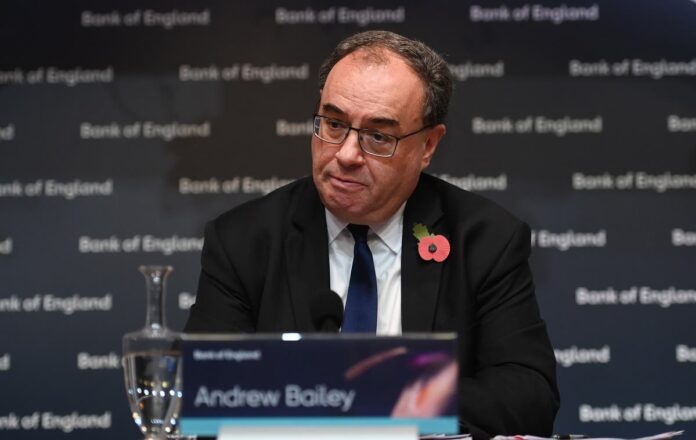The Bank of England’s latest missive reads like a horror story written in the traditionally bland language of economics. The headline is obviously the decision to increase interest rates by 0.75 per cent to 3 per cent by the rate-setting Monetary Policy Committee (MPC).The last time they were this high was in November 2008. It’s more than 30 years since we have an increase of this magnitude. The vote, however, was split. In the end, it went 7-2. The dissidents were newbie Swati Dhingra, who undercut the rest of the committee in her first meeting by plumping for a 0.5 rate rise this time, and Silvana Tenreyro. She clearly decided no one was stealing her crown as the MPC’s dove in chief, favouring an increase of just 0.25 per cent. The borrowers’ best pals, then? It has lately gotten a bit easier for those looking to either remortgage when their fixed rate deal comes to an end, or take out a new loan. The damage done by Liz Truss and Kwasi Kwarteng dragging the nation into a grim right-wing fever dream has unwound, to some extent. Fixed rate deals are priced based on market expectations for rates. They’ve come down a lot. The current market view is that they’ll peak at around 4.5 per cent. Under Truss, people were talking about 6.25 per cent and perhaps even more. But that’s not much comfort. That unpleasant word ‘repossession’ is starting to slip back into the housing market lexicon. Dhingra and Tenreyro both justified their dovish stances in similar ways. To paraphrase: the UK economy is looking decidedly shaky. We’ve kicked it a lot with the rises we’ve already imposed. Perhaps we should wait a bit and see how things move before bringing the hammer down again?Their colleagues, however, were unmoved. Inflation is expected to top 11 per cent, and the Bank’s governor Andrew Bailey warned of ‘upside risks’ at the MPC’s press conference. Translation: if we’ve got it wrong with our forecasts, we’ve probably under estimated how bad it may get. There was a clear warning that more rate rises are on the way. The economy is just going to have to take one for the team. For what it’s worth, I think the MPC’s majority is right, for all that their decision will cause a lot of pain. The government’s energy support package will reduce the peak of inflation, and arithmetic will force the number down sometime next year because the recent energy price rises will have worked their way through the system by then. Inflation is, remember, calculated as a percentage, comparing this years prices to last year’s. However, the MPC is clearly still worried – and it is right to be. It isn’t just the price of energy that is causing a problem. Inflation can be very hard to get rid of if it become entrenched. It has, nonetheless, actually proven to be quite dovish as a body. Central banks tend to move in packs, and while the Bank of England moved with the pack this time, it has undershot its global peers on previous occasions. The markets think rates will peak at around 4.5 per cent. The Bank has been guiding them down and there was more of the same at Bailey’s press conference. This decision was also taken before the fiscal squeeze that’s coming from chancellor Jeremy Hunt. Truss and Kwarteng thought they could give UK plc a sugar rush by cutting taxes for the wealthy. Hunt is going to do the opposite. Brace yourself, because we’re in for a long recession. A very long recession. A near two-year slump if the Bank is right. It is at least expected to be shallow. But that doesn’t offer much in the way of comfort. The current thinking is that unemployment still doubles from its very low level (3.4 per cent), although again, previous downturns have seen much higher levels of joblessness. To keep up to speed with all the latest opinions and comment, sign up to our free weekly Voices Dispatches newsletter by clicking here Politically, the forecasts look like very bad news for the Tories, who will probably end up going into an election without much sign of recovery to boost their fortunes. This is no more than they deserve. It is interesting to note that Bailey referenced what I’ve called the ‘idiot premium’ – the extra the UK has to pay to borrow because of the government’s rush of blood to the head and the turmoil it caused. He just didn’t call it that. It has come down. But there will be lingering effects, which is the last thing the nation needs against such a grim backdrop. Bailey insisted he wasn’t talking politics. He was merely discussing policy when he said ‘we will have to work hard’ to ensure these lingering effects are blown away. He will probably have irritated some of the dimmer lights on the Tory benches with his words all the same. But I think we can live with their distemper. The fact is that the UK was always going to get hit as a result of Russia’s invasion of Ukraine and the other economic nasties currently stalking the world. All major economies have suffered to some extent. But Truss and Kwarteng’s moment of madness amplified the impact here. Shame on them. As for the future, buckle up. It won’t be as bad as it was shaping up to be a few weeks ago. But I’m afraid that it’s still going to get a deal worse before it gets better. The light at the end of the tunnel is a long way off.


